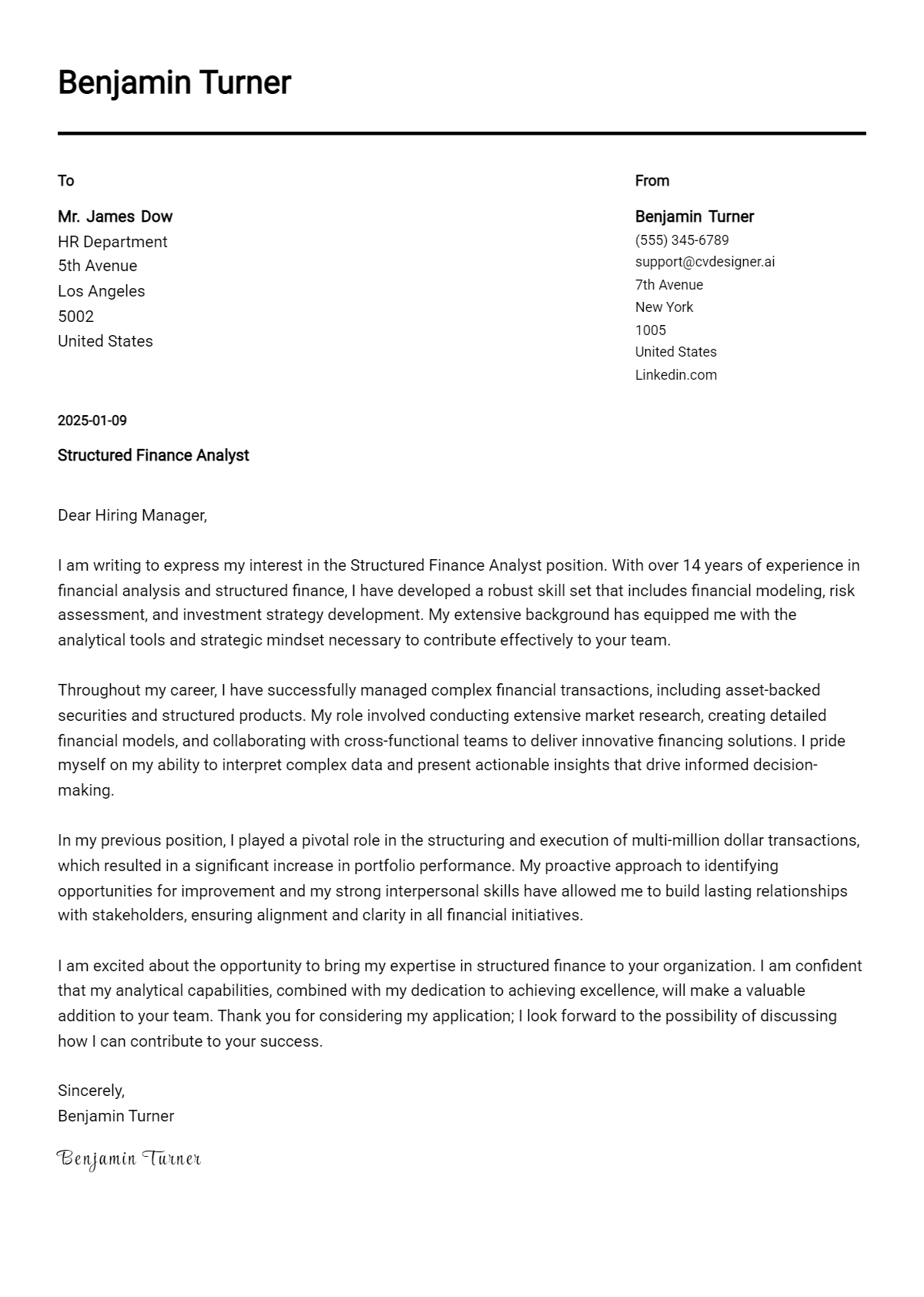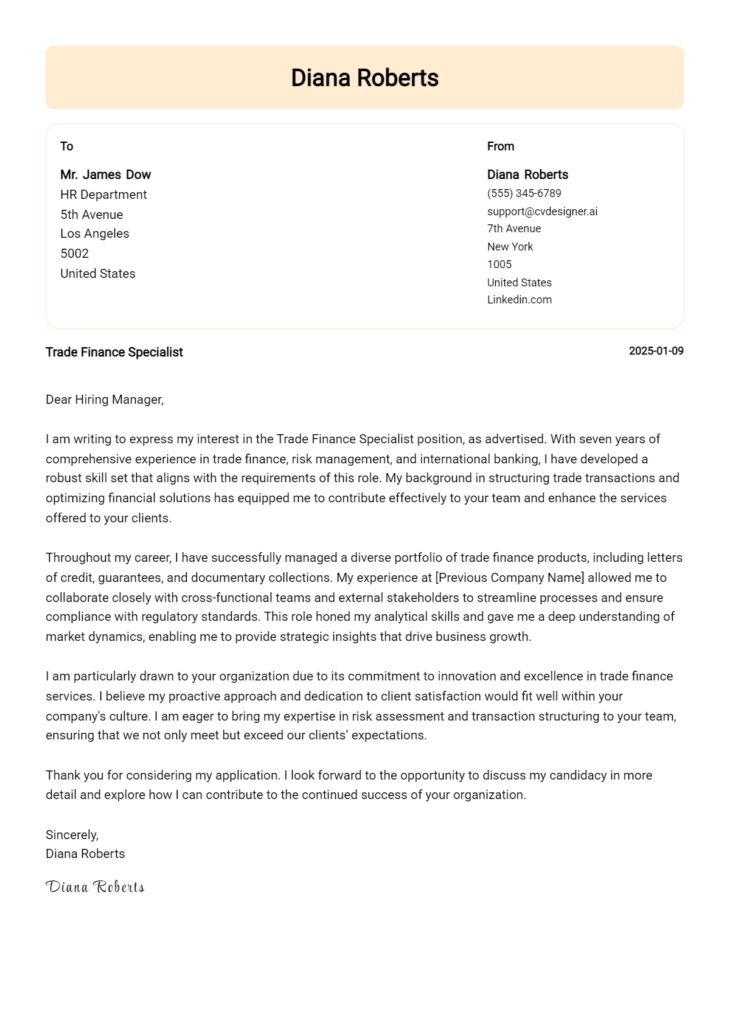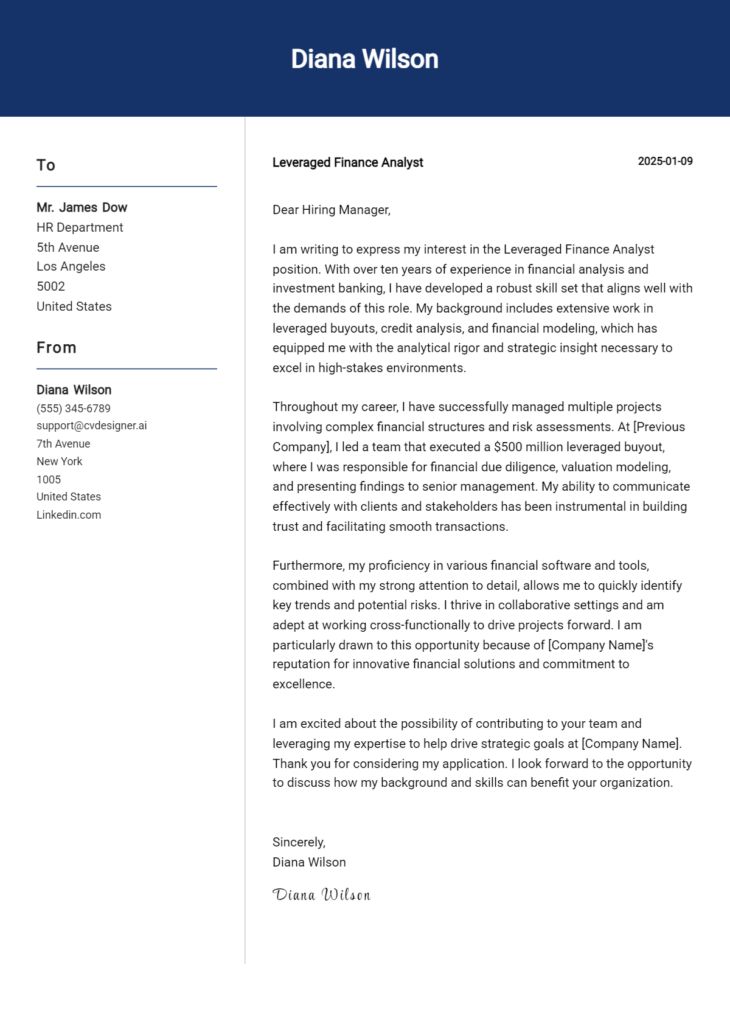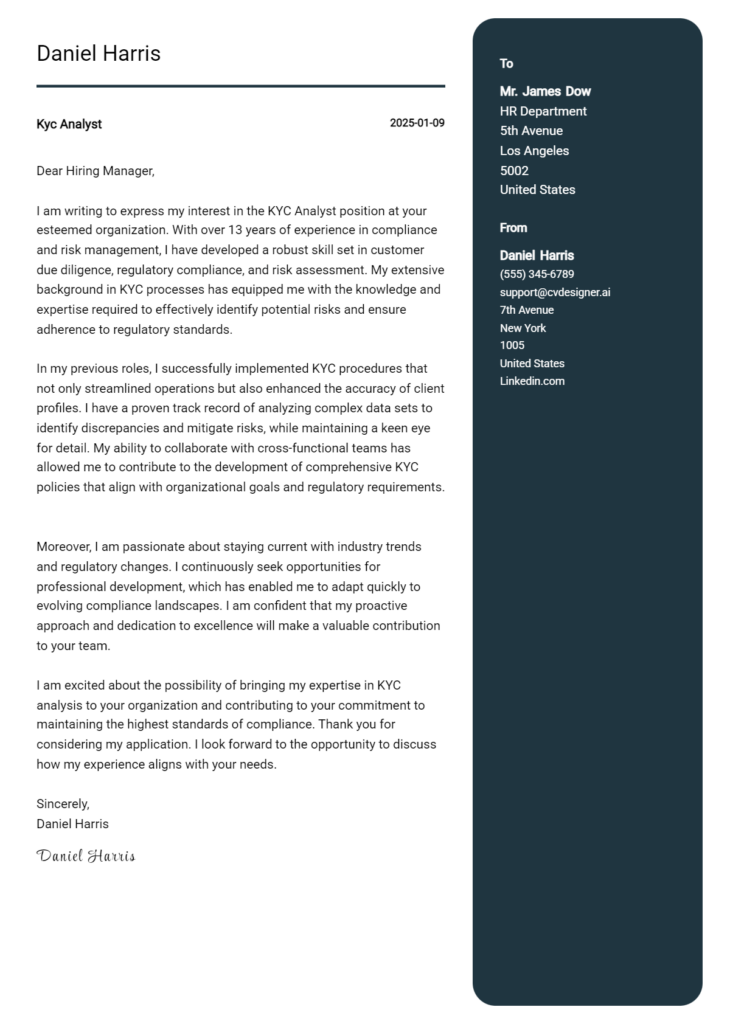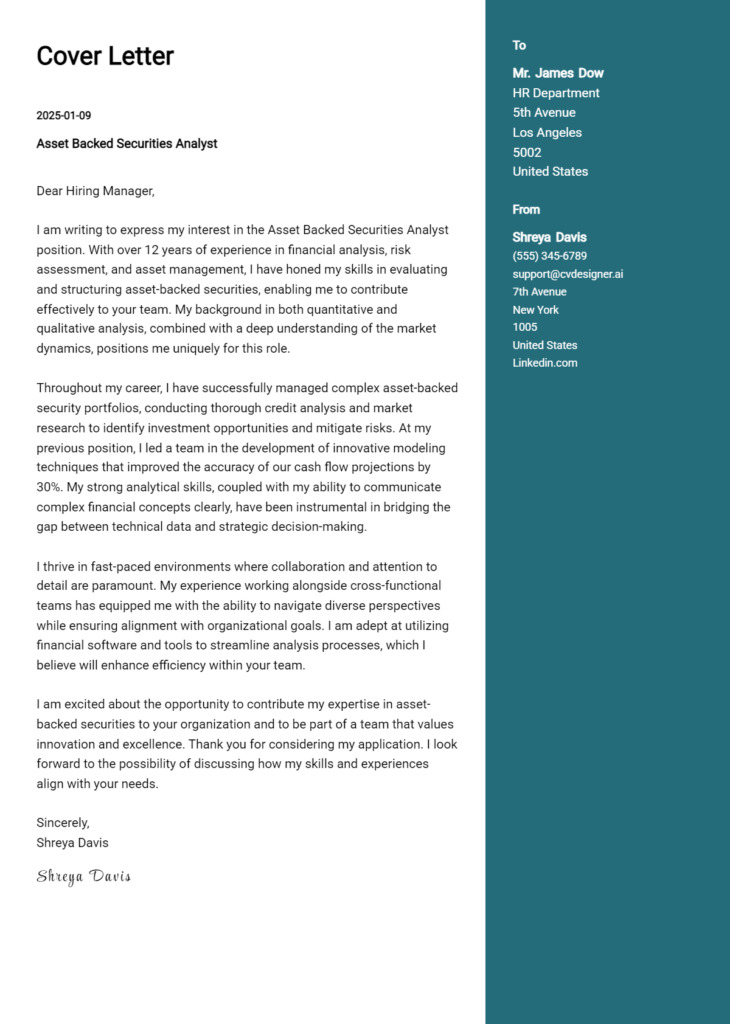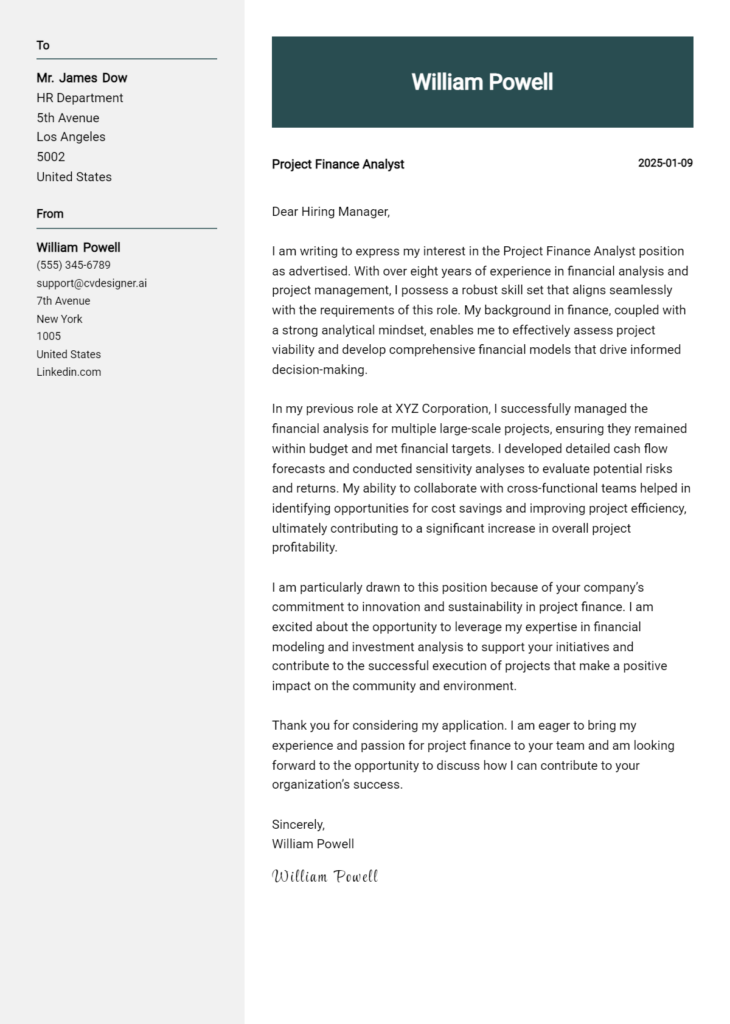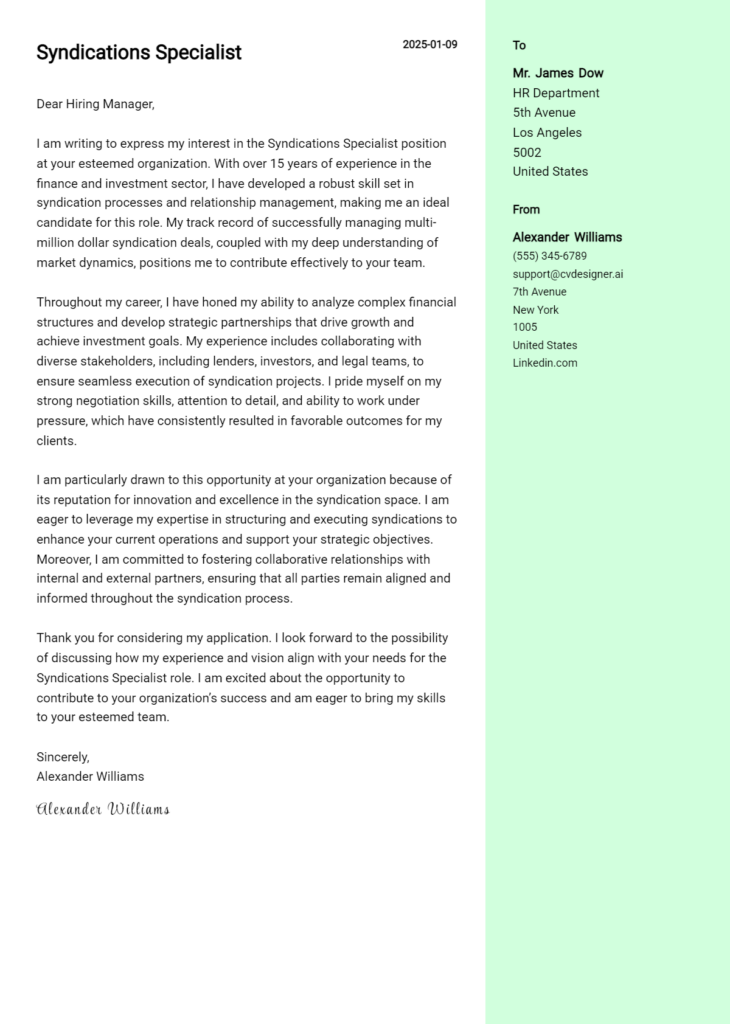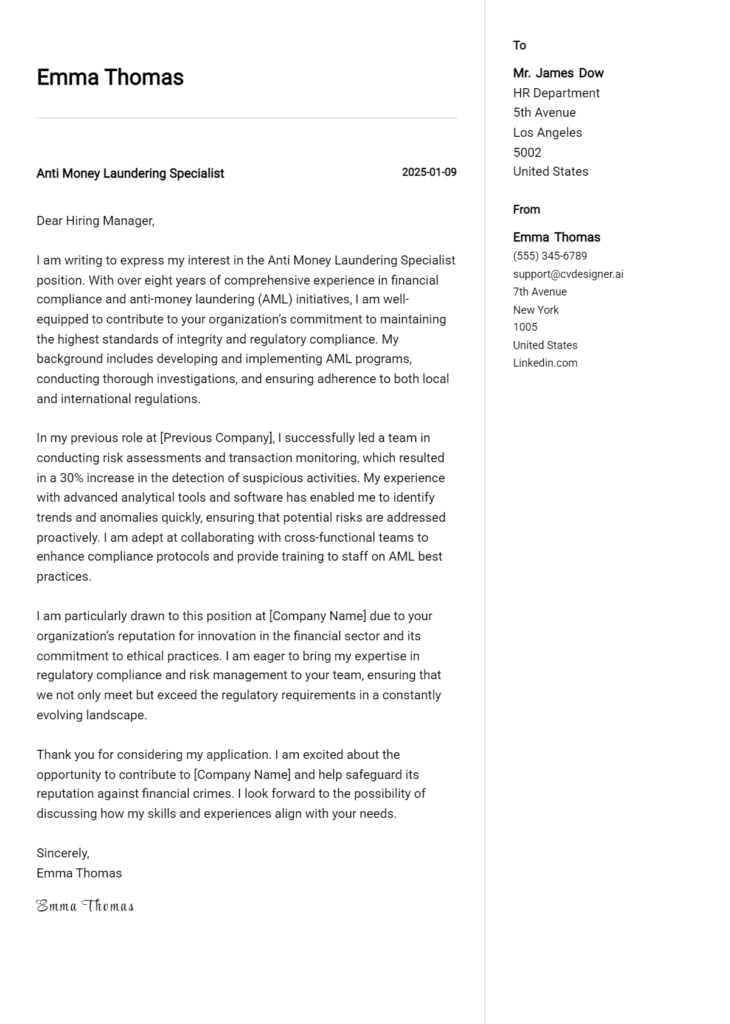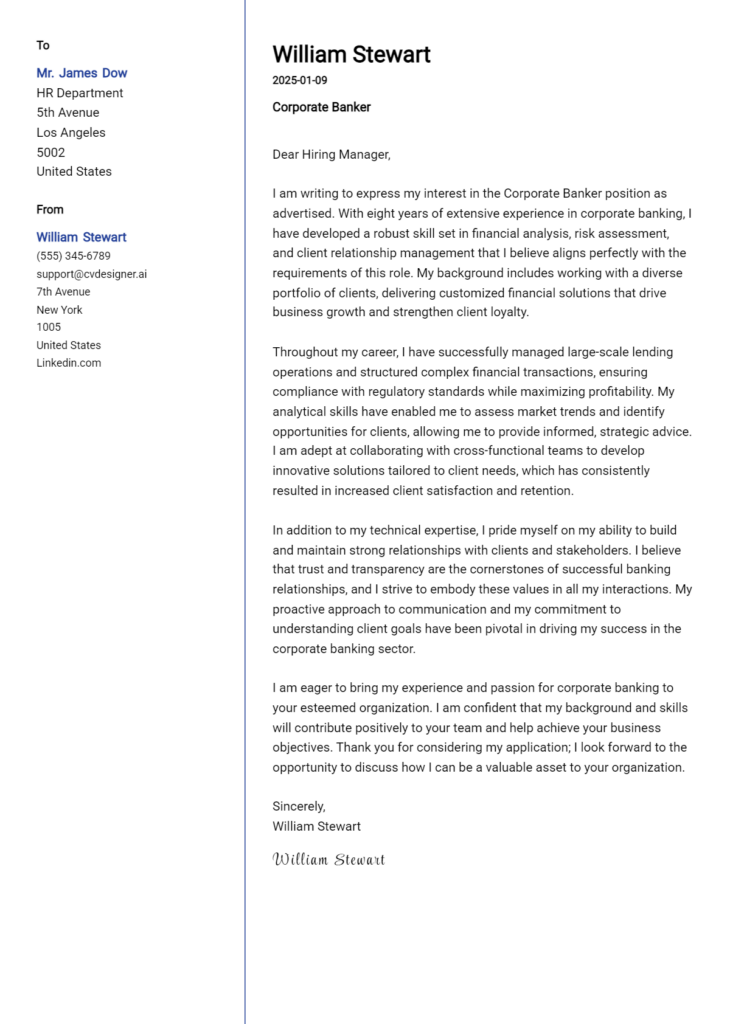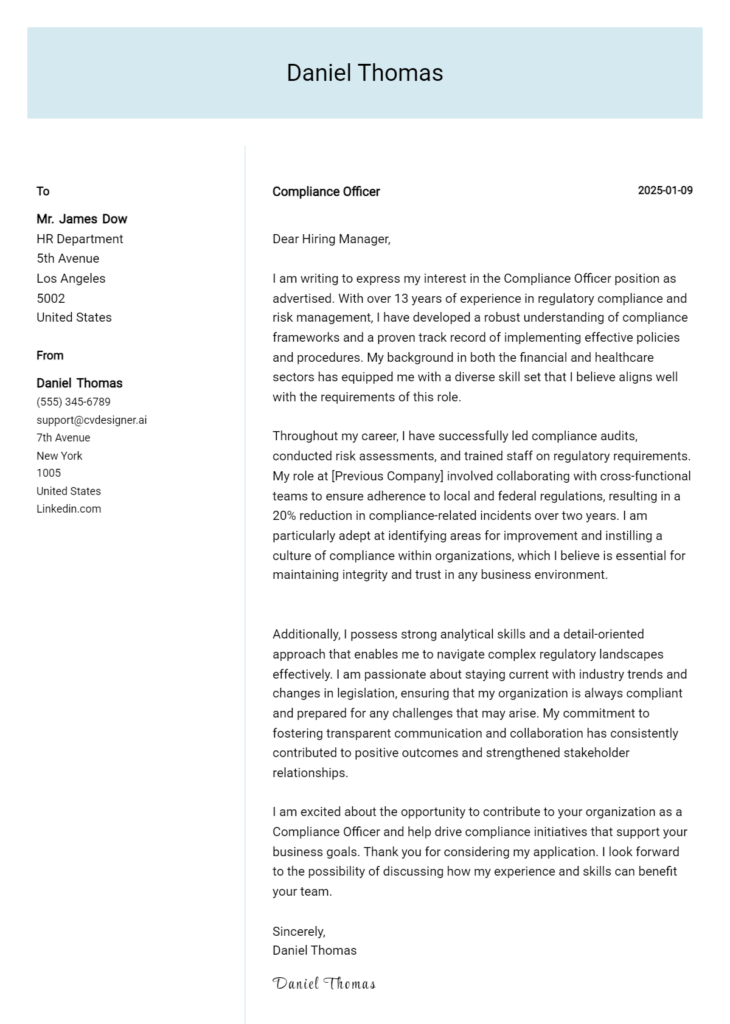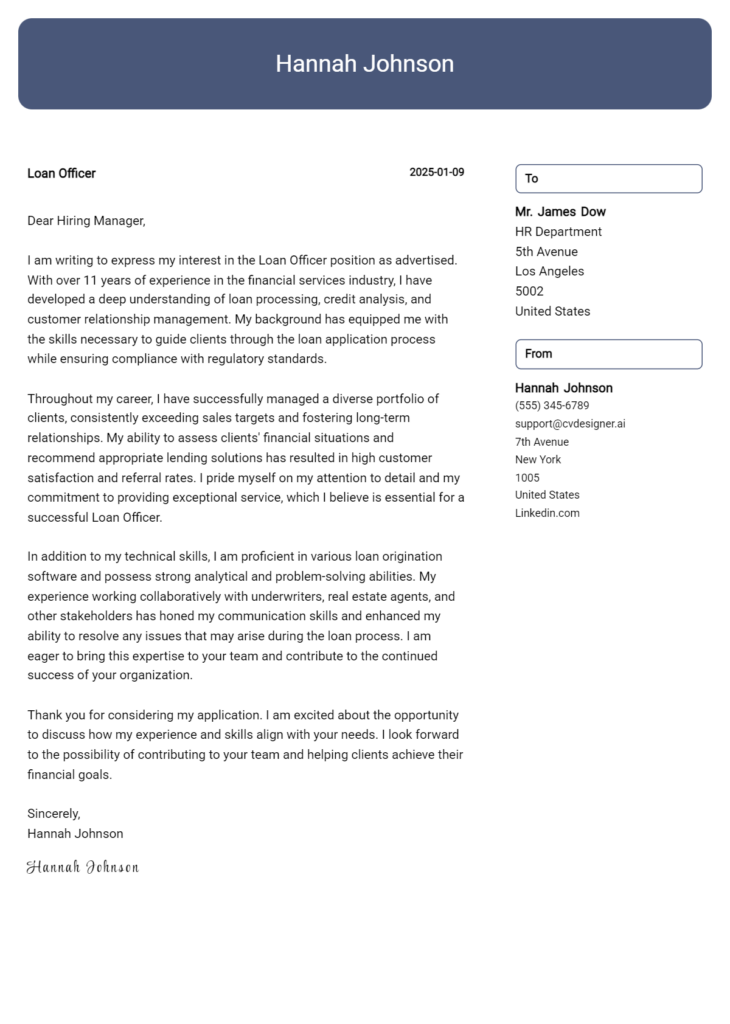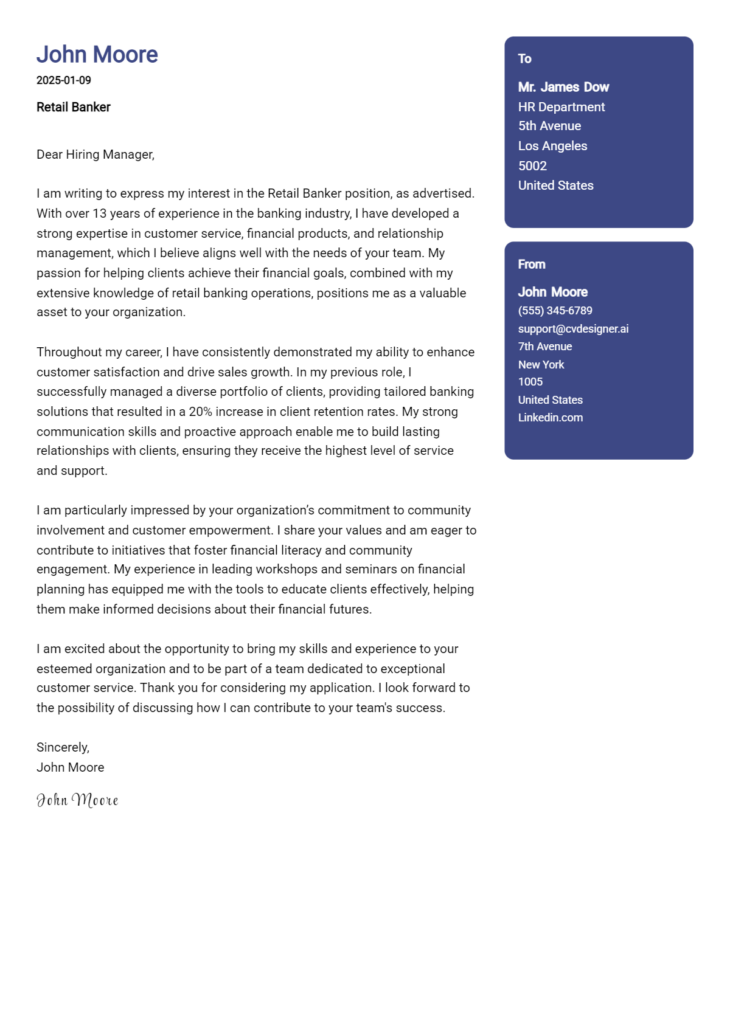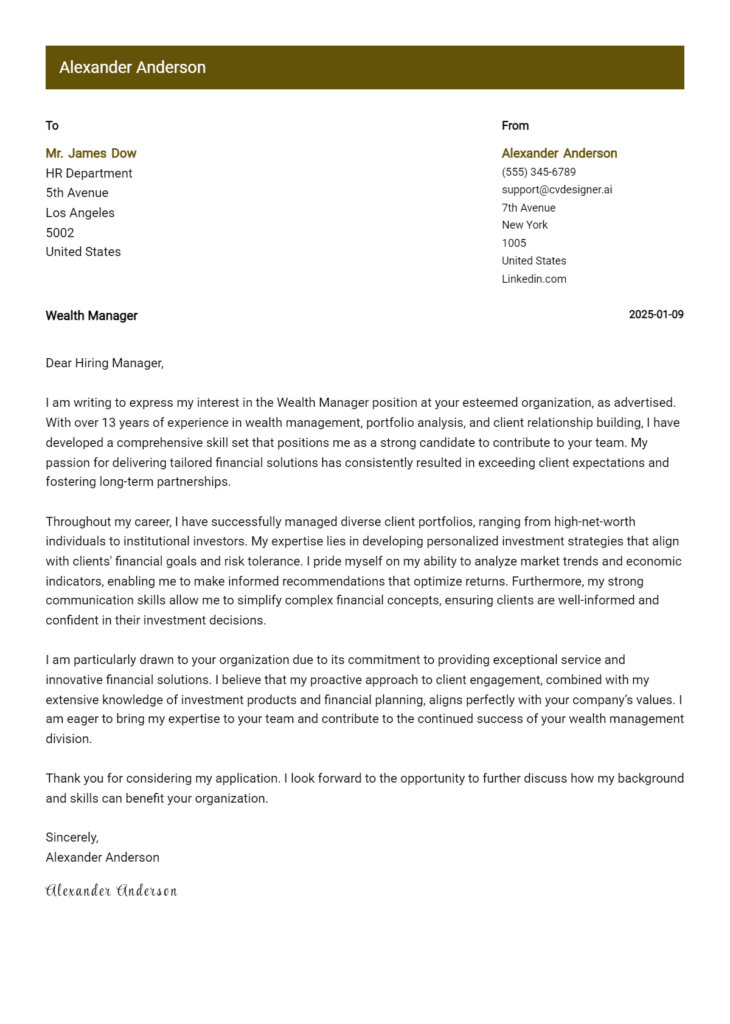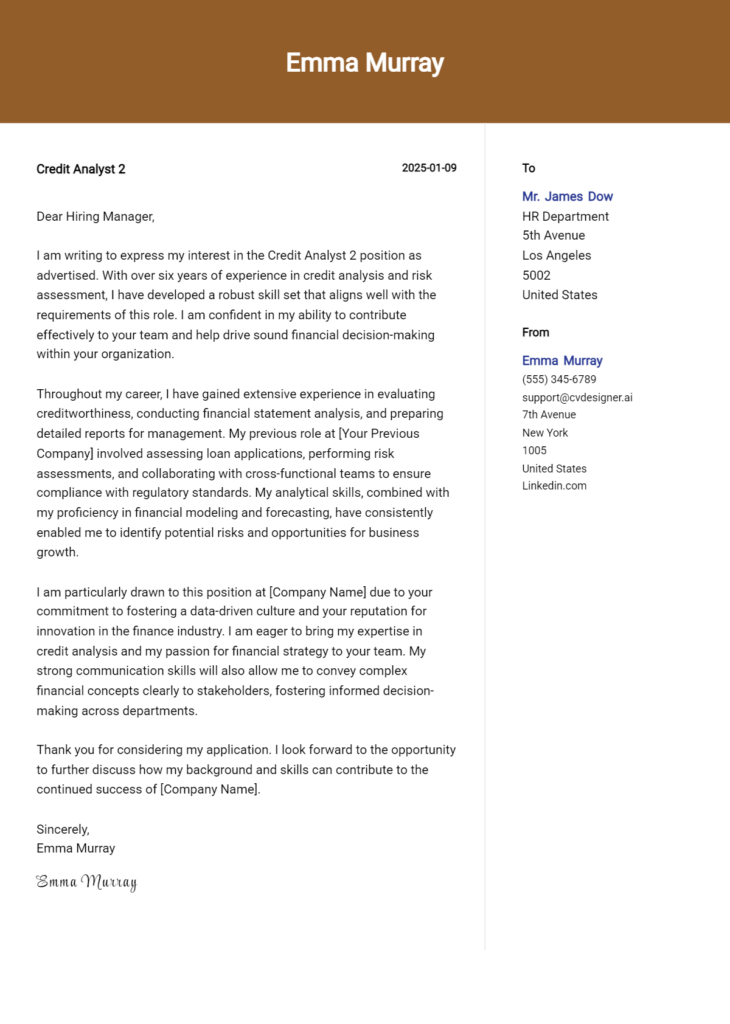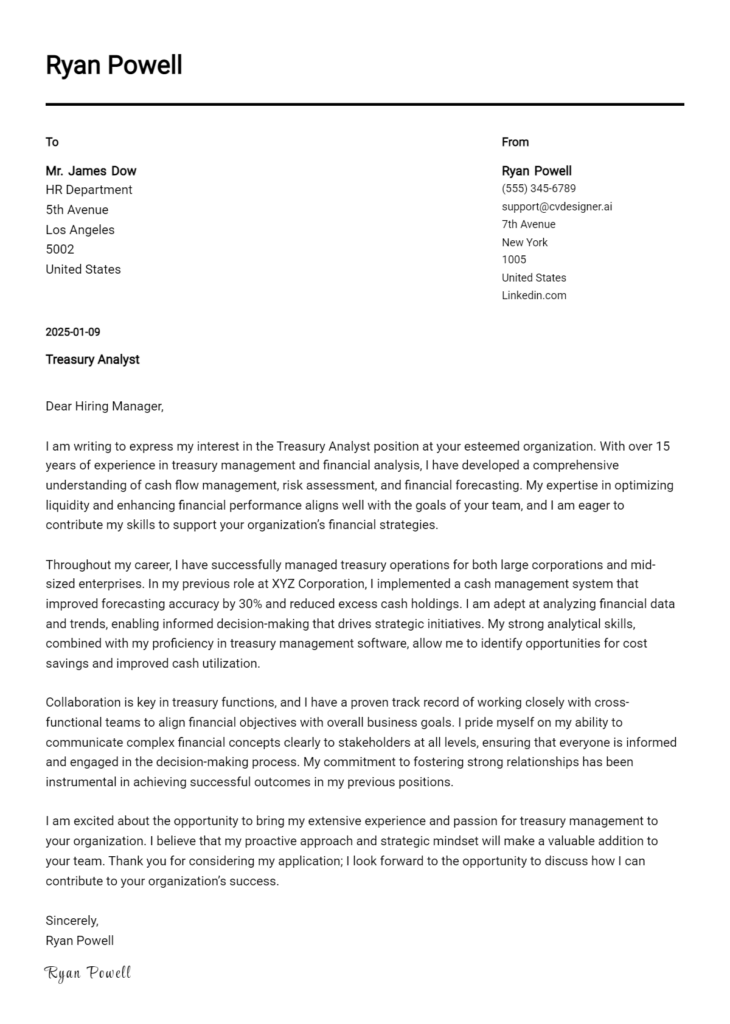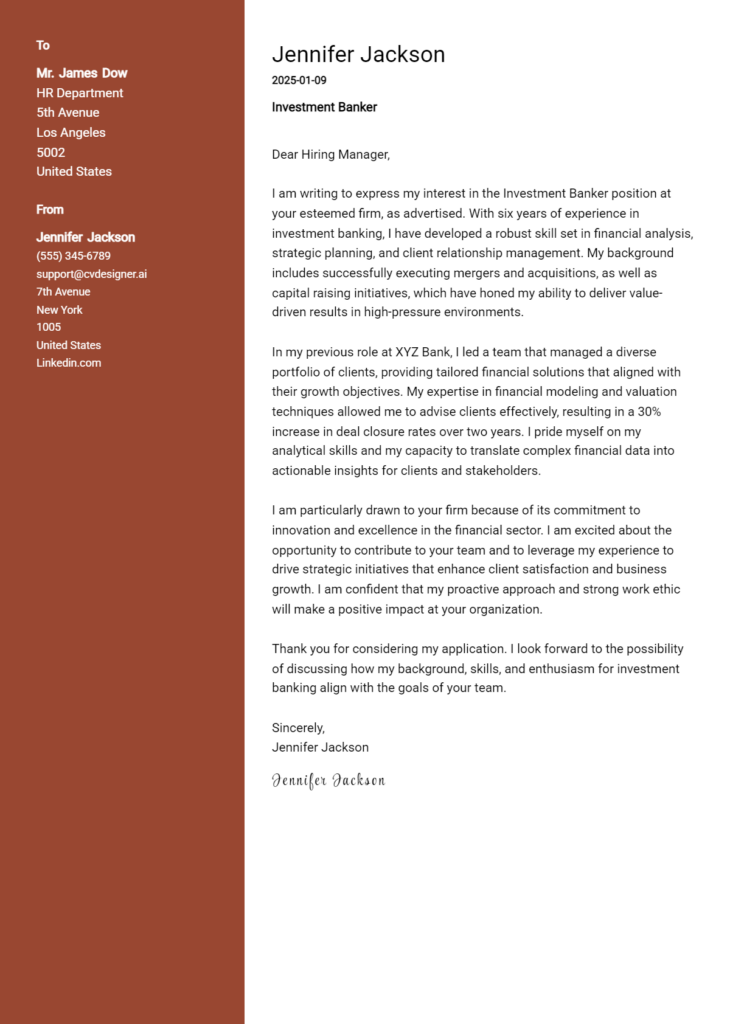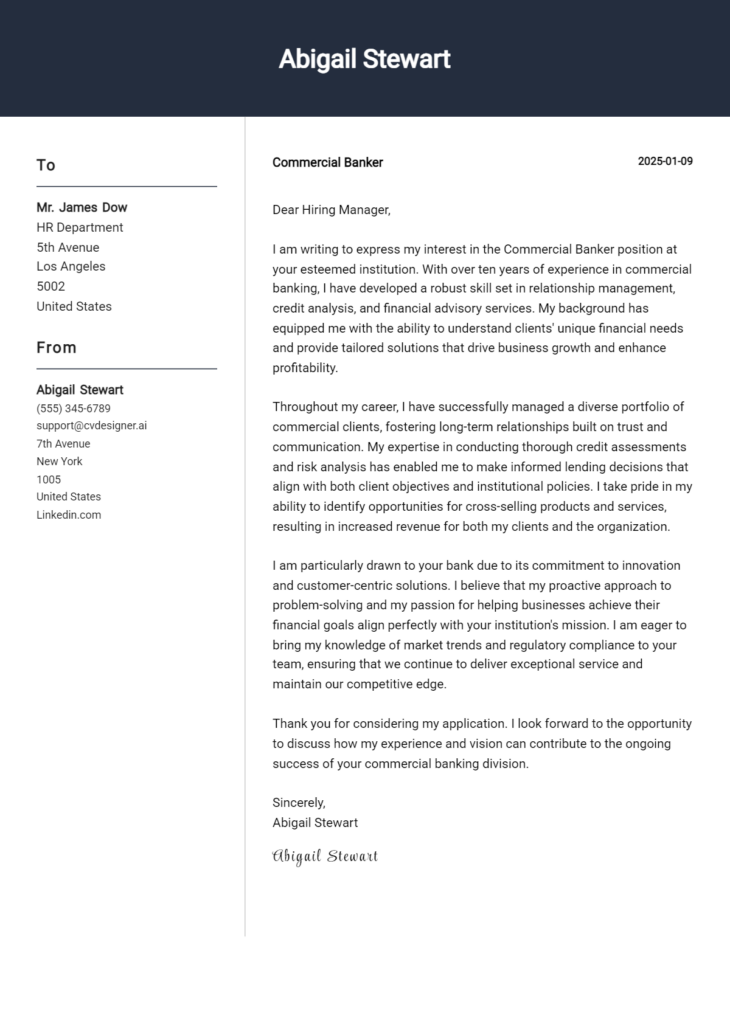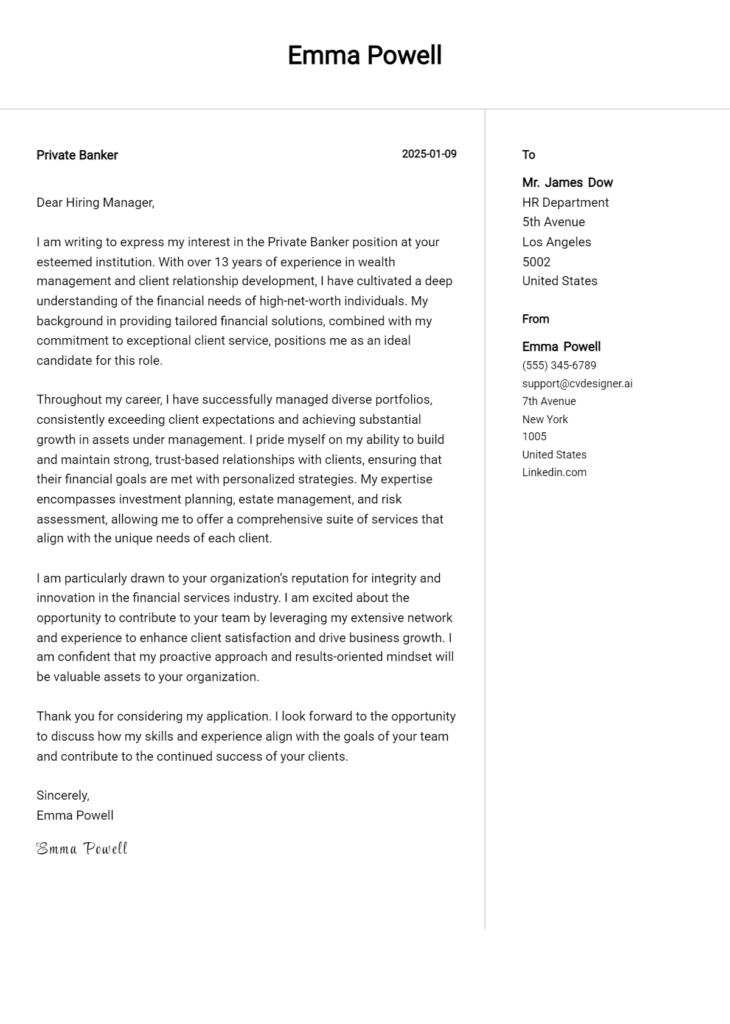Structured Finance Analyst Cover Letter Examples
Explore additional Structured Finance Analyst cover letter samples and guides and see what works for your level of experience or role.
How to Format a Structured Finance Analyst Cover Letter?
Crafting an effective cover letter for a Structured Finance Analyst position is essential for making a strong first impression. The format of your cover letter not only conveys your qualifications but also reflects your organizational skills and analytical thinking—critical attributes in structured finance. A well-structured cover letter can engage the hiring manager, showcasing your ability to present complex information clearly and concisely.
In this guide, we'll delve into the key components of a professional cover letter tailored for the structured finance field, including:
- Cover Letter Header
- Cover Letter Greeting
- Cover Letter Introduction
- Cover Letter Body
- Cover Letter Closing
Each section is crucial for emphasizing your expertise and professionalism. Let’s explore how to structure each part effectively to ensure your cover letter stands out in a competitive job market.
Importance of the Cover Letter Header for a Structured Finance Analyst
A well-structured cover letter header is crucial for a Structured Finance Analyst as it sets the tone for professionalism and clarity. The header should include essential contact information, the date, and the recipient's details. This not only helps the recipient identify who the letter is from but also reflects your attention to detail and organizational skills, which are vital in the finance sector. A clear and polished header can create a positive first impression, showcasing your commitment to professionalism.
Strong Example Title
Strong Example:
John Doe 123 Finance St. Cityville, ST 12345 (123) 456-7890 johndoe@email.com October 1, 2023 Jane Smith Hiring Manager XYZ Financial Services 456 Investment Ave. Business City, ST 67890
Weak Example Title
Weak Example:
Hey, I’m John. 123 St. Cityville. 10/1/23 To Whom It May Concern,
The Importance of the Cover Letter Greeting
The greeting of your cover letter is crucial as it sets the tone for the entire document. A well-crafted greeting demonstrates professionalism and shows that you have taken the time to personalize your application, which can significantly impact the hiring manager’s impression of you. Addressing the recipient directly reflects your attention to detail and respect for the hiring process. To avoid generic greetings like "To Whom It May Concern," it's essential to research the hiring manager's name, which can often be found on the company’s website or LinkedIn. This small effort can make your cover letter stand out and create a more engaging connection right from the start.
Strong Greeting Example
Dear Ms. Johnson,
Weak Greeting Example
To Whom It May Concern,
Importance of a Well-Crafted Cover Letter Introduction for a Structured Finance Analyst
A well-crafted cover letter introduction is crucial for a Structured Finance Analyst, as it sets the tone for the entire application and serves as the first impression to the hiring manager. This introduction should grab the reader's attention, effectively express the candidate's enthusiasm for the role, and succinctly highlight relevant skills or achievements that align with the job requirements. A strong introduction not only piques interest but also establishes the applicant as a serious contender for the position, while a weak introduction may fail to convey the candidate's qualifications or passion, ultimately risking dismissal from consideration.
Strong Example
Dear [Hiring Manager's Name], I am excited to apply for the Structured Finance Analyst position at [Company Name], where I can leverage my five years of experience in financial modeling and risk assessment to contribute to your team. My recent achievement of successfully structuring a $200 million securitization deal has equipped me with the analytical and strategic skills necessary to excel in this role, and I am eager to bring my expertise to [Company Name] to drive innovative financial solutions.
Weak Example
To whom it may concern, I saw the job posting for a Structured Finance Analyst and thought I would apply. I have worked in finance for a while and have some experience with financial models. I think I could do this job.
Cover Letter Body for Structured Finance Analyst
The body of a cover letter for a Structured Finance Analyst serves as a critical platform for candidates to articulate their unique qualifications and demonstrate the value they can bring to a prospective employer. It allows candidates to showcase relevant skills and experiences, particularly through specific projects or accomplishments that align with the firm's objectives. By detailing past achievements, such as successful financial modeling, innovative risk assessment strategies, or impactful collaboration on structured finance transactions, candidates can illustrate their competence and readiness to contribute effectively to the team.
Strong Example
Dear Hiring Manager, I am excited to apply for the Structured Finance Analyst position at XYZ Corp. In my previous role at ABC Financial Services, I led a team in the development of a complex securitization model that increased our asset-backed securities issuance by 30% over the past year. My ability to conduct rigorous credit analysis and collaborate with cross-functional teams allowed us to identify and mitigate risks effectively, resulting in a successful transaction valued at over $200 million. Additionally, my proficiency in utilizing advanced financial software to create detailed cash flow projections has been instrumental in driving strategic decision-making. I am eager to bring my analytical skills and innovative approach to structured finance to the talented team at XYZ Corp. Sincerely, [Your Name]
Weak Example
Dear Hiring Manager, I am applying for the Structured Finance Analyst job. I have worked in finance for a few years and have done some projects. I am good with numbers and can use Excel. I helped my team with some reports, and I think I can do well at your company. I want to learn more about structured finance and hope to get this job. Best, [Your Name]
Importance of the Cover Letter Closing for a Structured Finance Analyst
The closing paragraph of a cover letter is crucial as it serves to summarize your qualifications, reiterate your enthusiasm for the role, and encourage the hiring manager to take the next steps, such as reviewing your resume or scheduling an interview. A strong closing can leave a lasting impression and reinforce your fit for the position, while a weak closing may diminish the impact of the entire letter.
Strong Example
Thank you for considering my application for the Structured Finance Analyst position. With my extensive background in financial modeling, risk assessment, and data analysis, I am excited about the opportunity to contribute to your team at [Company Name]. I am particularly drawn to [specific aspect of the company or role], and I believe my skills align well with your needs. I look forward to the possibility of discussing my application further and am eager to provide insights into how I can support [Company Name]'s objectives. Please feel free to contact me to schedule an interview at your earliest convenience.
Weak Example
I hope you look at my resume. I think I could do the job okay. If you want to talk, that would be good. Thanks for your time.
These tips will help candidates craft an effective cover letter for a Structured Finance Analyst position. In this competitive field, it’s crucial to clearly showcase your technical skills, problem-solving abilities, knowledge of the Software Development Life Cycle (SDLC), teamwork experience, and a passion for continuous learning. A well-structured cover letter can set you apart from other applicants and demonstrate your suitability for the role.
Tips for Writing an Effective Cover Letter for a Structured Finance Analyst
Highlight Technical Skills: Begin your cover letter by emphasizing your technical skills relevant to structured finance, such as financial modeling, data analysis, and proficiency in software tools like Excel, SQL, or Python. Provide specific examples of how you have used these skills in previous roles to solve complex financial problems or enhance processes.
Showcase Problem-Solving Abilities: Structured finance often involves tackling intricate financial scenarios. Illustrate your problem-solving capabilities by sharing a specific instance where you identified a challenge, analyzed the data, and implemented a successful solution. Use metrics or outcomes to quantify the impact of your actions.
Demonstrate SDLC Knowledge: If applicable, mention your understanding of the Software Development Life Cycle and how it integrates with financial projects. Describe any experiences where you participated in the development or implementation of finance-related software solutions, emphasizing your role in ensuring that projects met both financial and technical requirements.
Emphasize Teamwork and Collaboration: Structured finance is rarely a solo endeavor; it's essential to work effectively with teams. Share examples of successful collaboration with cross-functional teams, such as finance, IT, or risk management. Highlight your ability to communicate complex financial concepts clearly to non-financial stakeholders, showcasing your interpersonal skills.
Express a Passion for Continuous Learning: The finance industry is constantly evolving, so it's important to convey your enthusiasm for ongoing education and professional development. Mention any relevant certifications, workshops, or courses you have pursued to stay updated with the latest trends and technologies in structured finance. This demonstrates your commitment to improving your skills and adapting to industry changes.
Common Mistakes to Avoid in a Structured Finance Analyst Cover Letter
Avoiding common mistakes in your cover letter is crucial for standing out in the competitive field of structured finance. A well-crafted cover letter can make a significant difference in your job application, so it's essential to steer clear of common pitfalls. Here are some mistakes to watch out for and tips on how to avoid them:
Generic Language: Using vague phrases like "I am a hard worker" fails to convey your specific skills. Instead, highlight concrete achievements that demonstrate your expertise in structured finance.
Lack of Research: Failing to tailor your cover letter to the company shows a lack of interest. Research the firm’s projects and values, and mention how your skills align with their needs.
Overly Technical Jargon: While technical skills are important, excessive jargon can alienate the reader. Use clear language to explain your experience and avoid overwhelming the hiring manager.
Ignoring the Job Description: Not addressing the specific qualifications listed in the job description can be detrimental. Be sure to incorporate relevant keywords from the job posting to show you fit the role.
Neglecting Formatting: A cluttered or poorly formatted letter can distract from your content. Keep your cover letter professional with proper spacing, clear headings, and a readable font.
Failure to Proofread: Typos and grammatical errors can make you appear careless. Always proofread your letter or ask someone else to review it before submission.
Being Too Lengthy: A lengthy cover letter can lose the reader’s attention. Aim for a concise one-page letter that highlights your key qualifications and makes a strong impression.
Cover Letter FAQs for Structured Finance Analyst
What should I include in my cover letter for a Structured Finance Analyst position?
In your cover letter for a Structured Finance Analyst role, you should focus on your relevant educational background, such as degrees in finance, economics, or mathematics. Highlight any experience with financial modeling, risk assessment, or investment analysis. It's essential to mention specific software or tools you are proficient in, such as Excel, Bloomberg, or financial databases. Additionally, showcase your analytical skills and ability to interpret complex financial data. Tailor your cover letter to the specific job description by using keywords and phrases from the listing. Finally, conclude with a strong statement expressing your enthusiasm for the role and the company, demonstrating your knowledge of their operations and values.
How can I demonstrate my analytical skills in my cover letter?
To effectively demonstrate your analytical skills in your cover letter, provide concrete examples from your academic or professional experiences. Discuss specific projects where you analyzed financial data, created financial models, or conducted market research that led to actionable insights. Use quantifiable metrics to illustrate your impact, such as improved investment returns or successful risk assessments. You can mention any relevant coursework or certifications that have honed your analytical capabilities, such as CFA or Excel modeling courses. Additionally, express your logical problem-solving approach and how it has benefited your previous employers or academic projects, ensuring the hiring manager sees you as a capable candidate for a Structured Finance Analyst position.
How long should my cover letter be?
Your cover letter should ideally be one page long, comprising three to four paragraphs. Aim for a concise and focused approach, with each paragraph serving a distinct purpose. Start with an engaging introduction that captures the hiring manager's interest and states the position you are applying for. The middle paragraphs should detail your skills, experiences, and achievements relevant to structured finance, while the closing paragraph should reiterate your enthusiasm for the role and the company. Keep the overall length between 250 to 400 words to ensure you cover all essential points without overwhelming the reader. This length is sufficient to convey your qualifications while maintaining the reader's attention.
Should I tailor my cover letter for each job application?
Yes, you should absolutely tailor your cover letter for each job application, particularly for a Structured Finance Analyst position. Customizing your cover letter demonstrates your genuine interest in the specific role and company. Begin by closely reading the job description to identify key responsibilities and required skills. Then, emphasize your relevant experiences that align with these requirements. Mention any industry-specific knowledge you possess or highlight projects that directly relate to the work you'll be doing. Personalizing your cover letter also allows you to connect your career goals with the company's mission and values, making a stronger case for why you are the ideal candidate for that specific position.
Build your Cover Letter in minutes
Use an AI-powered cover letter builder and have your letter done in 5 minutes. Just select your template and our software will guide you through the process.

